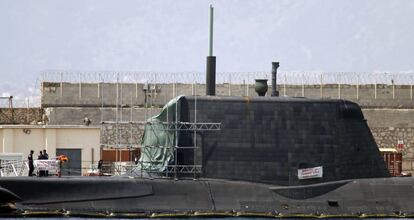Royal Navy fires flares at Spanish research ship in waters near Gibraltar
The incident happened in an area that is contested by Spain and the United Kingdom
The waters near the British overseas territory of Gibraltar have once again become the scene of conflict between Spanish vessels and the Royal Navy. At the weekend, a British navy speedboat tried to stop researchers from the Spanish Oceanographic Institute (IEO) from deploying a sonar buoy in the waters in the Bay of Gibraltar.

The scientists were on board the vessel Ángeles Alvariño, in an area that is disputed by Spain and the United Kingdom, according to Spanish news website Europa Sur. The tensions were sparked on Friday, when the Royal Navy gave the ship a warning over the radio. The dispute deepened, according to British news agency the Press Association (PA), when the HMS Sabre then fired warning flares toward the Spanish scientific mission.
The ship’s presence in the disputed area was due to the need to take samples with concrete parameters, “that can only be done in that area”
The IEO confirmed that the incident had taken place, but played down its importance, explaining that these kinds of confrontation are “usual” in the area. “For years now this kind of conflict is common,” explained sources from the institute. “The patrols usually approach our ships to warn us that we are invading their waters. We inform them that we are carrying out a scientific investigation.” On this occasion, the same thing happened. The Royal Navy fired “the flares into the air,” the IEO explained, despite “the researchers not showing any kind of conflictive attitude.”
The research ship was in the area “to study the morphology and sedimentary dynamic of the Algeciras canyon to be able to evaluate the geological risks associated with this structure,” the IEO stated. The project began last Friday and will finish on November 25, and will count on IEO researchers from Cádiz, Málaga and Madrid, as well as other research institutions in Spain.
The ship’s presence in the disputed area was due, according to the institution, to the need to take samples with concrete parameters, “that can only be done in that area.” As such, the IEO said it tried to collect the samples “as quickly as possible.” In fact, the ship is currently being escorted by the Royal Navy to a new area in waters that are not an area of conflict.
While the IEO has tried to play down the incident, there has been a range of reactions from both sides. Gibraltar’s chief minister, Fabián Picardo, yesterday told the Gibraltar Chronicle that he had been in contact with the commander of the British forces on “The Rock,” Mike Walliker, due to the presence of the Ángeles Alvariño in waters considered to be under British sovereignty.
In Spain, the government has announced that it will lodge a formal protest for the “interference” of the Royal Navy
“I congratulate the Royal Navy for the work they have undertaken so far in very challenging circumstances in light of the reckless disregard for safety displayed by the official Spanish vessels involved,” Picardo told the newspaper. The British defense minister added that the presence of the ship in waters that London claims as its own constitutes an “illegal incursion into the British territorial waters in Gibraltar,” and announced that a formal protest would be lodged with the Spanish government.
Meanwhile in Spain, the government has announced that it in turn will lodge a formal protest with the United Kingdom for the “interference” of the Royal Navy with the vessel’s scientific research. But the Foreign Ministry is yet to specify how this protest will take shape, being able to opt for a verbal note or by recalling the British ambassador in Madrid.
This is not the first time that both states have faced off over the waters that surround The Rock. Spain argues that the waters where this new incident took place are Spanish given that, in the 1713 Utrecht Treaty, the city and Gibraltar castle (together with its port, defense and fortress) were ceded to the British crown. That did not include the isthmus that joins Gibraltar with the peninsula, nor the surrounding waters. As such, Spain only recognizes British sovereignty over the waters on the inside of the port. For years now, London has been claiming as its own up to three nautical miles of waters, based on the UN Convention on the Law of the Sea, which came after the Utrecht agreement and awards any territory the adjacent waters.
English version by Simon Hunter.
Tu suscripción se está usando en otro dispositivo
¿Quieres añadir otro usuario a tu suscripción?
Si continúas leyendo en este dispositivo, no se podrá leer en el otro.
FlechaTu suscripción se está usando en otro dispositivo y solo puedes acceder a EL PAÍS desde un dispositivo a la vez.
Si quieres compartir tu cuenta, cambia tu suscripción a la modalidad Premium, así podrás añadir otro usuario. Cada uno accederá con su propia cuenta de email, lo que os permitirá personalizar vuestra experiencia en EL PAÍS.
¿Tienes una suscripción de empresa? Accede aquí para contratar más cuentas.
En el caso de no saber quién está usando tu cuenta, te recomendamos cambiar tu contraseña aquí.
Si decides continuar compartiendo tu cuenta, este mensaje se mostrará en tu dispositivo y en el de la otra persona que está usando tu cuenta de forma indefinida, afectando a tu experiencia de lectura. Puedes consultar aquí los términos y condiciones de la suscripción digital.









































